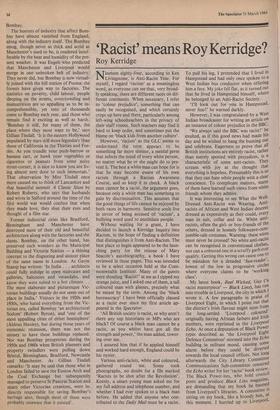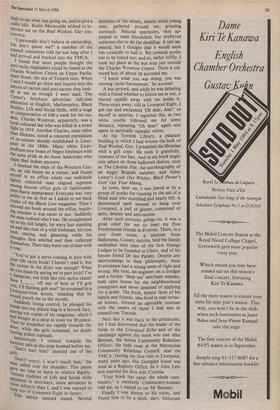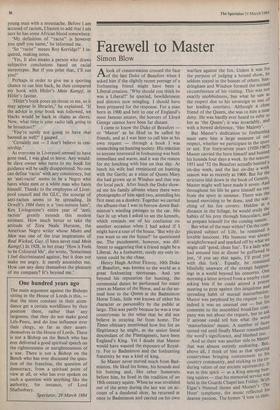'Racist' means Roy Kerridge?
Roy Kerridge
Nineteen eighty-four, according to Ken Livingstone, is Anti-Racist Year. For myself, I regard 'racism' as a meaningless word, as everyone can see that, very broad- ly speaking, there are different races on dif- ferent continents. When necessary, I refer to 'colour prejudice', something that can easily be recognised, and which certainly crops up here and there, particularly among left-wing schoolteachers in the privacy of their staff rooms. Such teachers may find it hard to keep order, and sometimes put the blame on 'black kids from another culture'.
However, 'racism' as the GLC seems to understand the term appears to be something far more sinister, a mental germ that infects the mind of every white person, no matter what he or she might do to pre- vent it. The best a white man can hope for is that he may become aware of his own racism through a Racism Awareness Course, and so keep it in check. A black man cannot be a racist, the argument goes, because only a white man has something to gain by discrimination. This assumes that the good things of life cannot be enjoyed by both races in harmony. Sensitive souls live in terror of being accused of 'racism', a bullying word used to annihilate people.
Without waiting for a grant, I have decided to launch a Kerridge Inquiry into Racism, in the hope of finding a definition that distinguishes it from Anti-Racism. The best place to begin appeared to be the laun- ching party for the reissue of Mary Seacole's autobiography, a book I have reviewed in these pages. This was intended to be a select occasion held at the Com- monwealth Institute. Many of the guests were shouting 'Racist!' at me as I sipped my orange juice, and I asked one of them, a tall coloured man with glasses, precisely what he meant by the term. Among the 'black bureaucracy' I have been officially classed as a racist ever since my first article ap- peared in the Spectator.
'All British society is racist, or why aren't there any top historians or MPs who are black? Of course a black man cannot be a racist, as you whites have got all the strength and power,' the man added, tower- ing over me.
I assured him that if he applied himself and worked hard enough, England could be his oyster.
Various anti-racists, white and coloured, gathered round me. Some took photographs, no doubt for a file marked 'Racists to be shot after the Revolution'. Keenly, a smart young man asked me for my full address and telephone number, and whether I had ever spoken to a black man before. He added that anyone who con- tributed to the Daily Mail must be a racist.
To pull his leg, I pretended that I lived in Hampstead and had only once spoken to a West Indian bus conductor when offering him a fare. My joke fell flat, as it turned out that he lived in Hampstead himself, where he belonged to an Anti-Racist Society.
'I'll look out for you in Hampstead, never fear!' he warned darkly.
However, I was congratulated by a West Indian broadcaster for writing an article on an instance of colour prejudice in the BBC. 'We always said the BBC was racist!' he exulted, as if this good news had made his day and he wished to hang the bunting out and celebrate. Eagerness to prove that all British institutions are entirely racist, rather than merely spotted with prejudices, is a characteristic of some anti-racists. They scream with joy at the thought that everything is hopeless. Presumably this is so that they can hate white people with a clear conscience. To complicate matters, man)' of them have learned such views from white friends whom they admire.
It was interesting to see What the well- Dressed Anti-Racist was Wearing. Anti- racists of African and West Indian descent dressed as expensively as they could, every man in suit, collar and tie. White anti racists, often the girl- or boy-friends of the others, dressed in homely folkweave-cum- jumble-sale costumes. Warning: these wires must never be crossed! No white anti-racist can be recognised in conventional clothes, nor can a coloured one in a scruffy garb ever qualify. Getting this wrong can cause one to be mistaken for a dreaded `Sun-reader', lowest of the low in progressive circles where everyone claims to be "working class'.
My latest book, Real Wicked, Guy Ca racist masterpiece' — Black Linx), has run into trouble in Liverpool, the city in which 1 wrote it. A few paragraphs in praise of Liverpool Eight, in which I point out that the district's Irish flavour might stem from, the long-settled 'Liverpool coloured originally having African fathers and Irish mothers, were reprinted in the Liverpool Echo. At once a deputation of Black Power types described as 'the Liverpool Eight Defence Committee' stormed into the Echo building in militant mood, causing some alarm before they could be diverted towards the local council offices. Not long afterwards the City Library Committee Communications Sub-committee censured the Echo writer for her 'racist' book review.- The Black Power-ites, who hold council posts and produce Black Linx magazine, are demanding that my book be banned from Liverpool's libraries. A committee is sitting on my book, like a broody hen, at this moment. I hurried up to Liverpool, both to see what was going on, and to give a radio talk. Radio Merseyside wished to in- terview me on the Real Wicked, Guy con- troversy.
'I personally don't believe in censorship, but don't quote me?' a member of the council committee told me not long after I had arrived and booked into the YMCA.
I found that most people thought the anti-racist ringleaders could be found at the Charles Wootton Centre on Upper Parlia- ment Street, the site of Toxteth riots. When I said I would go there and inquire into the nature of racism and anti-racism they look- ed at me as though I were mad. The Centre's brochure advertises full-time education in English, Mathematics, Black Studies, Life and Social Skills, with a wage or compensation of £40 a week for the stu- dent. Charles Wootton, apparently, was a local coloured lad who was killed in a street fight in 1919. Another Charles, none other than Dickens, noted a coloured population of ex-seamen already established in Liver- pool in the 1840s. Many white Liver- Pudlians now boast of Negro forebears with the same pride as do those Americans who Claim Red Indian ancestry. I climbed the steps of the Wootton Cen- tre, an old house on a corner, and found myself in an office where one well-built lightly coloured man reigned supreme among buxom office girls of fashionable serni-Rasta appearance. Everyone was very Polite to me at first as I asked to see back Copies of the Black Linx magazine. Then I Showed my book around the office, inquir- ing whether it was racist or not. Suddenly the man realised who I was. He straightened up to his full height, his wavy hair standing on end like that of a wild Irishman, his eyes both staring and gleaming while his thoughts first whirled and then collected themselves. Then they burst out of him with a roar.
'You've got a nerve coming in here with Your vile racist book! I haven't read it, but the review in the Echo was enough! What d° You mean by saying we're part Irish? I'm a Jamaican not Irish like you racists claim! NOW f
off out of here or I'll gob
You, I'll flaming gob you!' he screamed in a Liverpool-Irish accent, meaning that he would punch me in the mouth.
Suddenly losing control, he plunged his bands into my plastic bag in a berserk fury, tearing out copies of his magazine, which I _had bought at a shop in town for 20 pence. Then he propelled me rapidly towards the door, while the girls screamed, no doubt fearing police reprisals.
Instinctively I twisted towards the banister rails as the steps loomed before me.
Don't hurt him!' shouted one of the girls.
'Don't worry, I won't touch him,' the man called over his shoulder. This pause gave me time to leave in relative dignity. Various students of Life and Social skills a.Ppeared in doorways, more advanced in these subjects than I, and I was warned to keep out of Liverpool Eight in future.
This advice seemed sound. Several
denizens of the streets, mostly white young men, gathered around me, grinning curiously. Natural spectators, they ap- peared to want bloodshed, but preferred someone else to do the shedding. A taxi ap- peared, but I thought that it would seem too cowardly to hail it. We cowards prefer not to be found out; and so, rather stiffly, I took my place at the bus stop just outside the Charles Wootton Centre. There a col- oured boy of about 16 accosted me.
'I know what you was doing, you was causing racial harassment,' he accused. A bus arrived, and while he was debating with a friend whether to follow me or not, it moved rapidly away with me inside it. Three stops away, still in Liverpool Eight, I got out and exclaimed 'Oh dear, dear!' to myself in surprise. I regretted this, as two white youths followed me for some distance, repeating 'Oh dear!' again and again in satirically squeaky voices. At the Toxteth Library, a pleasant building in which I had written the bulk of Real Wicked, Guy, I presented the librarian with a gift copy. He took it gratefully, unaware of the ban. And so my book might join others on those hallowed shelves, such as The Christie File, theautobiograPhyof an Angry Brigade member, and Julius Lester's Look Out Whitey, Black Power's Gon' Get Your Mama.
In town, later on, I was jeered at by a group of punks for running to the aid of a blind man who stumbled and nearly fell. A demoniacal spell seemed to hang over Liverpool, a pall of gloom, composed of spite, despair and anti-racism.
After such tortuous goings-on, it was a great relief for me to meet my Free Presbyterian friends in Everton. There, in a cosy front room, a minister from Ballymena, County Antrim, held the family enthralled with tales of the first Orange Lodges to be founded in Ulster, and of his bosom friend Dr Ian Paisley. Despite any shortcomings in their philosophy, these Evertonians had a strong sense of right and wrong. My host, an engineer on a dredger and a former 'deep sea' merchant seaman, held open house for the neighbourhood youngsters and never dreamed of applying for a grant. The fresh, honest faces of his family and friends, who lived in neat terrac- ed houses, formed an agreeable contrast with the sneers of those I had met in council-run Toxteth.
Next day it was back to the grindstone, for I had discovered that the leader of the foray to the Liverpool Echo and of the campaign against my book was one Alex Bennett, the Senior Community Relations Officer. He held sway at the Merseyside Community Relations Council, near the YMCA. During my first visit to Liverpool, many years ago, this Georgian house was used as a Registry Office. In it John Len- non married his first wife Cynthia.
'Your book has upset the whole com- munity,' a motherly Community-woman told me, as I waited to see Mr Bennett.
Finally I was shown to his room, and found him to be a sleek, alert, Italianate young man with a moustache. Before I am accused of racism, I hasten to add that I am sure he has some African blood somewhere.
'My definition of "racist" is however you spell you name,' he informed me.
`So "racist" means Roy Kerridger I in- quired, making notes.
'Yes, It also means a person who draws subjective conclusions based on racial stereotypes. But if you print that, I'll sue you!'
Perhaps in order to give me a sporting chance to sue him back, he then compared my book with Hitler's Mein Kampf, in Hitler's favour.
'Hitler's book poses no threat to me, so it may appear in libraries,' he explained. 'If the advice in your book was followed, we blacks would be back in chains as slaves. Now, what time is your radio talk going to be broadcast?'
'You're surely not going to have that banned as well?' I gasped.
'Certainly not — I don't believe in cen- sorship.'
As everyone in Liverpool seemed to have gone mad, I was glad to leave. Any would- be slave owner who turns to my book for guidance will be sadly disappointed. No one can define 'racist' with any consistency, but an 'anti-racist' seems to be a Negro who hates white men or a white man who hates himself. Thanks to the employees of Liver- pool council and the GLC, the scourge of anti-racism seems to be spreading. In Orwell's 1984 there is a 'two-minute hate'. Ken Livingstone's entire year of 'anti- racism' greatly extends this modest estimate. How much better to take the attitude of Zora Neale Hurston, the American Negro writer whose Mules and Men was one of the true inspirations of Real Wicked, Guy. (I have never read Mein Kampf.) In 1928, in her essay 'How it Feels to be Coloured Me', she wrote, 'Sometimes I feel discriminated against, but it does not make me angry. It merely astonishes me. How can any deny themselves the pleasure of my company? It's beyond me.'
















































 Previous page
Previous page